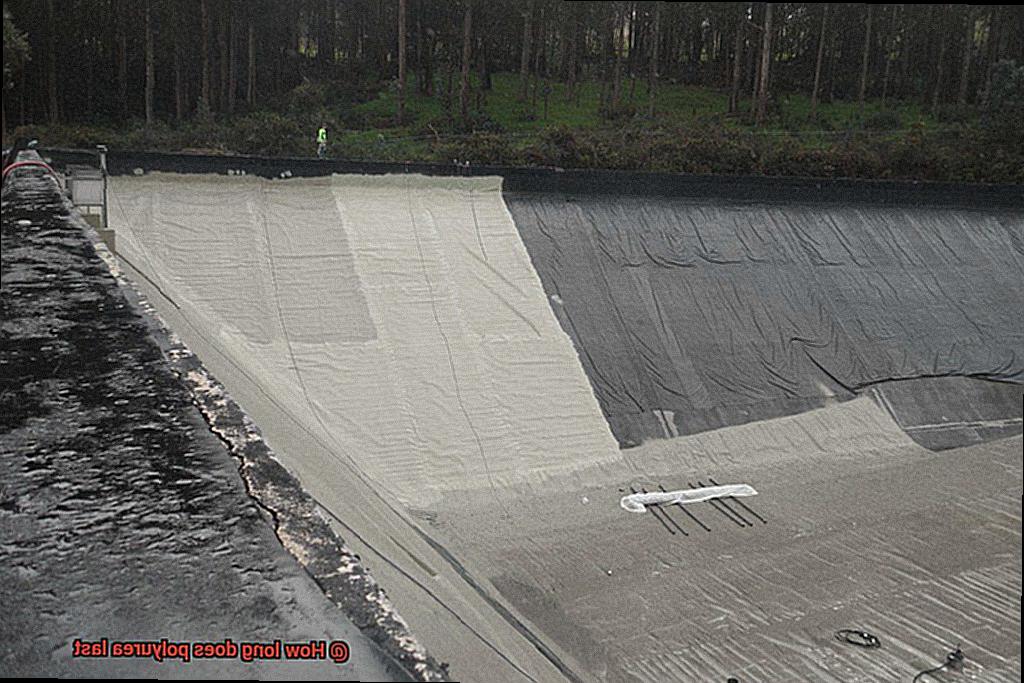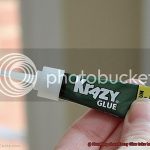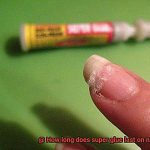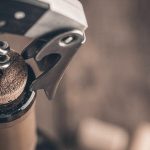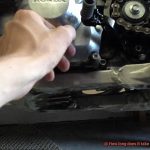Curious about the lifespan of polyurea?
Whether you’re a pro looking to tackle a commercial project or a DIY enthusiast ready to revamp your space, knowing how long polyurea lasts is key.
With its reputation for toughness and protection, it’s time to uncover the secrets behind this mighty coating. From application tricks to environmental factors, we’ll explore it all.
So, grab your favorite drink, get comfy, and let’s unveil the mystery of polyurea’s endurance.
Quality of the Polyurea Product: Key Factors to Consider
Contents
- 1 Quality of the Polyurea Product: Key Factors to Consider
- 2 Lifespan of Polyurea Coatings
- 3 Resistance to UV Radiation, Chemicals, Abrasion and Corrosion
- 4 Lifespan Dependent on Environment
- 5 Proper Installation and Maintenance for Optimal Performance and Longevity
- 6 Industrial Settings: Heavy Machinery and Equipment Protection
- 7 Commercial Buildings: Protective Coating for Floors, Roofs and Concrete Structures
- 8 Conclusion
Polyurea coatings have become increasingly popular due to their exceptional durability and longevity. However, the quality of the polyurea product is a critical factor in determining its lifespan and performance. In this article, we will explore key factors to consider when evaluating the quality of a polyurea product to ensure optimal longevity.
Formulation:
The formulation of the polyurea is vital for its quality and durability. Different manufacturers may use varying formulations, so it’s important to select a product that has been formulated with high-quality raw materials and has undergone rigorous testing. Look for products that are proven to withstand harsh conditions and provide long-lasting protection.
Application Process:
The application process is another crucial aspect to consider. Hiring experienced professionals who are trained in applying polyurea correctly ensures proper adhesion and coverage. This step is vital for achieving optimal performance and maximizing the lifespan of the coating.
Substrate Preparation:
Proper substrate preparation is essential for the longevity of polyurea coatings. The surface on which the coating is applied should be clean, dry, and free from contaminants or defects. Adequate surface preparation ensures optimal adhesion and helps prevent premature coating failure.
Environmental Conditions:
Environmental factors can significantly impact the quality and lifespan of polyurea coatings. Extreme temperatures, UV exposure, moisture, and chemical exposure are all potential stressors that can affect performance and durability. Choose a polyurea product specifically designed to withstand the specific environmental conditions it will be exposed to.
Regular Maintenance:
Regular maintenance and inspections are crucial for prolonging the lifespan of polyurea coatings. Promptly addressing any damage or defects prevents further deterioration or failure of the coating. Simple maintenance practices like cleaning and periodic inspections can go a long way in preserving the quality of your polyurea coating.
Lifespan of Polyurea Coatings
Polyurea coatings are the superheroes of the protective coating world. With their exceptional durability and long lifespan, they are the go-to choice for industries seeking reliable protection against harsh environments. But what factors actually influence the lifespan of these coatings? In this article, we will delve into the secrets of maximizing the longevity of polyurea coatings.
Quality Matters:
The first secret lies in the quality of the coating material itself. Investing in high-quality polyurea coatings ensures that you’re starting with a strong foundation. Look for reputable manufacturers and suppliers who adhere to strict quality control measures to ensure consistency and performance.
Proper Application Technique:
Applying polyurea coatings is an art form. It’s crucial to hire professionals who have the expertise and experience to apply the coating correctly. The technique used and the thickness of the coating play a significant role in determining its lifespan. A well-applied polyurea coating can withstand extreme temperatures, UV exposure, chemicals, abrasion, and impact.
Environmental Factors:
Polyurea coatings are designed to endure challenging environmental conditions. However, prolonged exposure to extreme temperatures, humidity levels, or corrosive substances can accelerate wear and reduce their lifespan. Regular inspections and maintenance can help identify any issues early on and extend the life of the coating.
Surface Preparation:
Proper surface preparation is key to ensuring optimal adhesion and longevity of polyurea coatings. Thoroughly cleaning the surface, removing contaminants, and applying appropriate primers create a strong bond between the substrate and the coating, preventing premature failure or delamination.
Regular Maintenance:
Just like any superhero needs proper care, polyurea coatings require regular maintenance to maintain their protective properties. Periodic cleaning, touch-ups, and repairs can go a long way in extending their lifespan and ensuring long-lasting protection.
Resistance to UV Radiation, Chemicals, Abrasion and Corrosion
In the realm of protective coatings, one superhero reigns supreme – polyurea. This extraordinary material possesses an arsenal of superpowers, enabling it to defy the forces of nature like no other. From withstanding the relentless assault of UV radiation to repelling corrosive chemicals, resisting abrasion, and battling against corrosion, polyurea coatings are the guardians that keep surfaces safe and strong for the long haul.
UV Resistance:
Like an impenetrable shield against the sun’s harmful rays, polyurea coatings exhibit exceptional UV resistance. With powerful additives at their disposal, these coatings can withstand the unrelenting assault of sunlight without fading, discoloration, or degradation. From rooftops to bridges and outdoor sculptures, polyurea ensures that surfaces remain pristine and vibrant, even under the most intense solar bombardment.
Chemical Resistance:
When it comes to chemical warfare, polyurea is an unrivaled champion. It fearlessly withstands exposure to a wide range of chemicals, from harsh acids to aggressive solvents and even fuel spills. This resilience makes it the ultimate choice for industrial environments where accidents are bound to happen. With polyurea as your guardian, you can confidently face any chemical challenge without worrying about corrosion or damage compromising your surfaces.
Abrasion Resistance:
In the battle against wear and tear, polyurea emerges as an invincible warrior. Its unique elastomeric properties grant it the ability to flex and absorb impacts without cracking or peeling. Whether it’s foot traffic or heavy machinery rolling over coated surfaces, polyurea takes the blows and continues to protect unyieldingly. With polyurea by your side, high-traffic areas or demanding working conditions will never compromise the integrity of your surfaces.
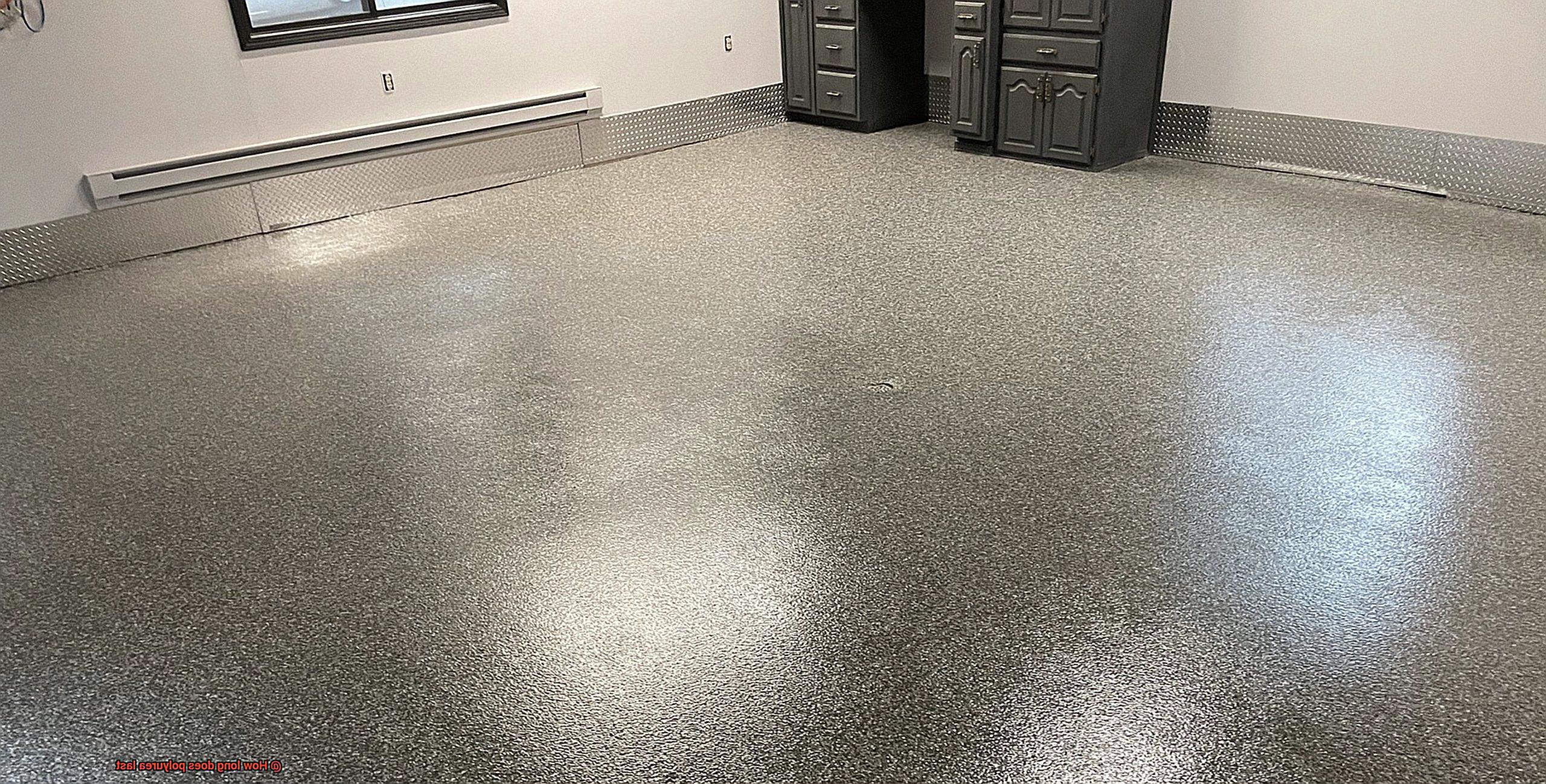
Corrosion Resistance:
Corrosion, the silent enemy that attacks metal surfaces with moisture and chemicals, stands no chance against the impenetrable armor of polyurea. This exceptional coating shields metal structures from the ravages of corrosion. By providing a seamless and impermeable barrier, polyurea prevents moisture and corrosive substances from reaching the underlying metal substrate. With polyurea’s unwavering resistance to corrosion, you can extend the lifespan of your metal equipment and structures while significantly reducing maintenance costs.
Lifespan Dependent on Environment
Polyurea coatings have revolutionized the protective coating industry with their exceptional durability. However, did you know that the environment in which these coatings are applied plays a crucial role in determining their lifespan? Join us as we explore the fascinating world of polyurea coatings and uncover how temperature, humidity, UV exposure, chemical exposure, and level of use can impact their longevity.
Temperature – The Heat is On:
Extreme temperatures can be the kryptonite for polyurea coatings. In scorching hot environments or areas with intense sunlight exposure, polyurea may experience accelerated aging and degradation. Conversely, in freezing cold environments, the coating can become brittle and susceptible to cracking. So, it’s essential to consider temperature extremes when applying polyurea coatings.
Moisture and Humidity – The Aquatic Challenge:
Polyurea coatings boast excellent resistance to water and moisture penetration. However, persistent dampness or high humidity levels can result in premature degradation or delamination. This is especially crucial for applications in areas exposed to constant rain or high humidity levels, such as swimming pools or outdoor structures.
Chemical Exposure – The Chemical Conundrum:
Polyurea coatings are highly resistant to various chemicals, but prolonged exposure to harsh chemicals can compromise their integrity. Assessing the specific chemicals present in the environment where polyurea is applied is crucial to ensure compatibility with the intended use. By doing so, you can guarantee that your polyurea coating remains an invincible shield against chemical attacks.
UV Exposure – The Battle Against Sunlight:
UV radiation from sunlight poses another challenge to polyurea coatings. While some formulations include UV stabilizers, prolonged exposure to direct sunlight can still cause gradual degradation. This is particularly relevant for outdoor applications like roof coatings or protective coatings for vehicles constantly exposed to sunlight. Choose formulations that provide enhanced UV resistance to combat this challenge.
Level of Use – The Wear and Tear Factor:
Areas with heavy foot traffic or constant vehicle movement can accelerate the wear and tear on polyurea coatings, leading to faster deterioration. Regular maintenance and periodic recoating may be necessary in such high-traffic areas to ensure the longevity of the polyurea coating. After all, even superheroes need a little TLC.
The lifespan of polyurea coatings is heavily influenced by the environment in which they are applied. Considering factors like temperature, moisture, chemical exposure, UV radiation, and level of use can maximize their lifespan and effectiveness.
Consulting with professionals experienced in polyurea applications is key to unleashing the full potential of this superhero coating in different environments.
Proper Installation and Maintenance for Optimal Performance and Longevity
Proper installation and maintenance are crucial for achieving optimal performance and longevity in glue applications. Whether you’re working on crafts, construction, or industrial projects, understanding the importance of these steps is essential for success. In this comprehensive guide, we will explore the sub-topics of proper installation techniques and effective maintenance practices to ensure your glue applications stand the test of time.
Proper Installation Techniques:
Surface Preparation:
- Thoroughly clean and prepare the bonding surfaces.
- Remove dirt, oil, and grease that hinder adhesion.
- Ensure a clean and smooth surface for maximum bond strength.
Application Techniques:
- Follow manufacturer’s guidelines and instructions carefully.
- Use recommended amount of glue for each application.
- Apply glue evenly and consistently across the entire bonding area.
- Consider temperature and humidity during application.
Curing Times:
- Allow sufficient time for the glue to cure before applying stress or load.
- Follow manufacturer’s recommended curing times for optimal bonding strength.
- Avoid premature handling or exposure to harsh conditions that may compromise the bond.
Effective Maintenance Practices:
Regular Inspections:
- Conduct routine inspections to identify signs of damage or wear.
- Address deteriorating areas promptly to prevent further damage.
Cleaning:
- Clean bonded surfaces regularly to maintain optimal performance.
- Use mild detergents and non-abrasive cleaning methods to avoid damaging the bond.
- Avoid harsh chemicals or abrasive materials that can cause scratches or degradation.
Protection from UV Radiation:
- Apply a UV-resistant topcoat to protect the bond from discoloration and degradation caused by sunlight.
- Use protective coverings for outdoor applications to shield the bond from excessive UV exposure.
Prompt Repairs:
- Address cracks or damages in the bond immediately to prevent further deterioration.
- Repairing damages promptly helps maintain the bond’s integrity and prevents water or moisture penetration.
Industrial Settings: Heavy Machinery and Equipment Protection
Look no further than polyurea coatings, the ultimate solution for protecting your valuable assets. With its remarkable resistance to abrasion, impact, chemicals, and corrosion, polyurea is the go-to choice for industries like manufacturing, construction, mining, and oil and gas.
So, what sets polyurea coatings apart from other options? Let’s delve into the details:
- Extended lifespan: When applied and maintained correctly, polyurea coatings have been known to last for many years. This means less downtime for repairs or replacements and more productivity for your business.
- Seamless and flexible barrier: By providing a seamless and flexible barrier, polyurea coatings effectively shield heavy machinery and equipment from damage caused by heavy use, harsh chemicals, or constant contact with abrasive materials. Say goodbye to premature wear and tear.
- Durability in extreme conditions: Industries dealing with extreme temperatures, moisture, or corrosive substances can greatly benefit from polyurea coatings. Whether you’re in mining or oil and gas, these coatings can significantly extend the lifespan of crucial components such as chutes, hoppers, conveyors, and tanks.
- Customizable formulations: Polyurea coatings can be tailored to meet specific industrial requirements. Need UV resistance or fire retardancy? Not a problem. These coatings can be formulated with additives to enhance desired properties, making them suitable for a wide range of applications.
-
Commercial Buildings: Protective Coating for Floors, Roofs and Concrete Structures
When it comes to safeguarding the floors, roofs, and concrete structures in commercial buildings, there is one unrivaled hero – polyurea coatings. These coatings, renowned for their durability and longevity, offer a multitude of benefits that make them the top choice for industries such as manufacturing, construction, mining, and oil and gas. In this blog post, we will delve into the advantages of polyurea coatings and why they are the ultimate solution for protecting commercial building assets.
Unmatched Durability:
Polyurea coatings are the epitome of resilience, with exceptional resistance to abrasion, impact, chemicals, and corrosion. This makes them perfect for high-traffic areas like warehouses, manufacturing facilities, and parking garages. Unlike traditional coatings, polyurea forms a seamless and flexible barrier that can endure heavy foot traffic, machinery movement, and exposure to harsh chemicals without deteriorating.
Long-Term Cost-Effectiveness:
Although the upfront cost of polyurea coatings may be higher than other options, their extended lifespan more than compensates for it. On average, polyurea coatings can last anywhere from 10 to 30 years in commercial settings. This means less frequent recoating or replacement, resulting in substantial long-term savings.
Effortless Application:
Polyurea coatings are applied using a spray-on technique that allows for fast and efficient installation. The coating cures rapidly, minimizing downtime in commercial buildings. With proper surface preparation and application techniques, polyurea coatings tightly adhere to the substrate, forming a robust bond that ensures long-term protection.
Impenetrable Waterproofing Properties:
The roofs of commercial buildings are constantly exposed to the elements – heavy rainfall, UV radiation, and more. Polyurea coatings offer unparalleled waterproofing properties that prevent leaks and extend the lifespan of the roof. The seamless membrane formed by polyurea adheres tightly to the roof surface, creating an impenetrable barrier against water damage.
Tailored Versatility:
Polyurea coatings can be customized to meet specific requirements, such as flexibility, hardness, and color. This versatility allows for tailored solutions to address unique challenges in different commercial building environments. Whether it’s safeguarding concrete structures, industrial floors, or commercial roofs, polyurea coatings can be formulated to provide the optimal level of protection.
-q8YUWBxk3E” >
Conclusion
In conclusion, the lifespan of polyurea coatings depends on several factors. These include the quality of the product, application techniques, substrate preparation, environmental conditions, and regular maintenance. To ensure a long-lasting polyurea coating, it is crucial to select a high-quality product formulated with top-notch raw materials and subjected to rigorous testing.
Applying polyurea requires skilled professionals who have been trained in proper application techniques. This ensures that the coating adheres well and provides optimal coverage. Additionally, thorough substrate preparation is essential for achieving maximum adhesion and longevity.
Environmental factors play a significant role in determining the lifespan of polyurea coatings. Extreme temperatures, UV exposure, moisture, and chemical contact can all impact the quality and durability of the coating. Regular maintenance and inspections are also necessary to prolong its lifespan.
Polyurea coatings are known for their exceptional durability and longevity. They act as an impenetrable shield against harmful UV rays and exhibit excellent resistance to chemicals, abrasion, and corrosion. Unlike other coatings, polyurea can withstand wear and tear without cracking or peeling.
The lifespan of polyurea coatings varies depending on environmental factors such as temperature extremes, moisture levels, chemical exposure, UV radiation, and level of use. By considering these factors during installation, you can maximize their effectiveness in different environments.
In industrial settings where heavy machinery and equipment require protection, polyurea coatings offer extended lifespans and a seamless barrier against damage from heavy use or harsh chemicals. They also provide durability in extreme conditions like high temperatures or corrosive substances. Furthermore, polyurea coatings can be customized to meet specific requirements.
For commercial buildings’ floors, roofs, and concrete structures protection needs, polyurea coatings provide unmatched durability with resistance to abrasion, impact chemicals corrosion; long-term cost-effectiveness with extended lifespans; effortless application with fast and efficient installation; impenetrable waterproofing properties for roof protection, and tailored versatility to address unique challenges in different environments.
Overall, polyurea coatings are a reliable and long-lasting solution for various applications.

